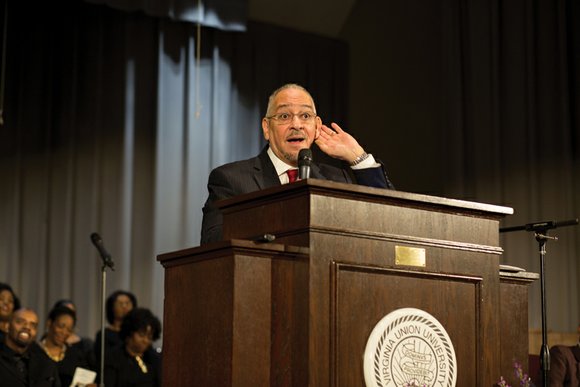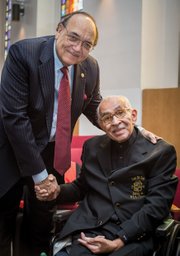Rev. Wright: Faith traditions give hope for life’s journey
Joey Matthews | 2/5/2016, 12:31 p.m.

His voice didn’t reach the thunderous crescendo for which he is well known.
Nor did he use the fiery cadences with which he has stirringly moved worshippers and other audiences for more than four decades.
Speaking in mostly soft, measured tones, the Rev. Jeremiah A. Wright, President Obama’s former pastor at Trinity United Church of Christ in Chicago, still drew enthusiastic applause from about 200 people last Thursday in the Allix B. James Chapel at Virginia Union University. Rev. Wright gave the sermon at the “Bridging the Gap Community Worship Service” to honor Dr. Wyatt Tee Walker, a Virginia Union alumnus and civil rights icon.
The service was the kickoff of the “Legacy of a Legend” weekend designed to commemorate Dr. Walker of Chesterfield County, a former chief of staff to Dr. Martin Luther King Sr.
The commemorative weekend was organized by the Wyatt Tee Walker Education Foundation and Gamma Chapter of Alpha Phi Alpha Fraternity, to which Dr. Walker has belonged for more than 70 years and Dr. King was a member, according to organizers.
Dr. Walker, who is now 86 and has health issues, attended an event on the VUU campus earlier in the day.
Rev. Wright, 74, is on the VUU Board of Trustees and an adjunct professor in the university’s Samuel DeWitt Proctor School of Theology.
He titled his biblical message “Singing the Songs of Zion,” and drew it from Psalm 137, verses 1 through 4. It tells of the enslaved Jewish people’s efforts to fight despair and ridicule while in exile following the Babylonian conquest of their home of Jerusalem in 607 BC.
In part, the scripture reads, “By the rivers of Babylon we sat and wept when we remembered Zion. … Our captors asked us for songs, our tormentors demanded songs of joy; they said, ‘Sing us one of the songs of Zion!’
“How can we sing the songs of the Lord while in a foreign land?”
Rev. Wright said their plight parallels that of the millions of enslaved Africans who were transported to the Caribbean and the Americas. They sang sacred spiritual songs to draw nearer to God, form bonds and gain strength to try and endure the horrific forms of abuse to which they were subjected.
After they came to the Americas, Rev. Wright said, “Africans took the words of white hymnists and put them in the tunes and the melodies from back home,” songs that many African-Americans still sing today in houses of worship.
“The Jews took their songs 5,448 miles from Bethlehem to Babylon.” By comparison, he added, “songs that were passed from (locales such as) Durban, South Africa, to Charleston, South Carolina” would have traveled 8,427 miles.
“Singing kept their faith traditions alive,” Rev. Wright said of the enslaved Jews and Africans. “Singing the songs of Zion keeps our faith traditions alive in this present generation,” he added of African-Americans.
He praised Dr. Walker’s lifelong efforts as an Afromusicologist to study, preserve and restore the sacred black songs for present and future generations.
“Wyatt Tee Walker spent his whole ministry trying to make sure we kept that tradition alive,” Rev. Wright said.
Rev. Wright called it a faith tradition “that says no to slavery and yes to freedom, a faith tradition that says no to mis-education and yes to liberation, and one that says, ‘If God be for us, who can be against us.’
“That faith, he added, “refuses to roll over and play dead in the face of injustice in Ferguson, will not sit down and shut up in a country with racist people, racist U.S. attorneys, racist grand juries and a broken criminal justice system, one that will look the other way when black men and black women are murdered.
“We have a faith tradition to keep alive in this generation, a faith tradition that says, ‘Yes, black lives do matter.’ ’’
Rev. Wright said it’s critical to preserve the sacred songs enslaved people sang to help bridge the gap with the present generation in order to demonstrate that the “faith we share today was forged in the flames of the hell called chattel slavery, that faith was formed in the nasty, stinking bowels of slave ships; that faith was carved out on the keloid scars on the backs, buttocks and breasts of African women and men who were beaten mercilessly by slave masters and slave drivers who, with their souls intact, held onto faith; was hammered out in the hangman’s noose of the white lynch mobs, who followed in the footsteps of the founding fathers such as George Washington, Thomas Jefferson and Benjamin Franklin, all of whom owned slaves while signing the Declaration of Independence.”
He said the sacred spiritual songs “remind us who brought us, who kept us and who never left us and remind us of who will never leave us.
“I, like Wyatt Tee Walker, am standing on a foundation laid for me years before I was born. And I’m laying a foundation for future generations that I will never, ever get to see in the flesh,” he concluded.
The Rev. Michael L.W. Moore of Mt. Vernon Baptist Church in the West End served as worship leader at the service, which also featured the church’s choir and band.
Powerful spoken word performances also were delivered by VUU undergraduate Destini Boyd in a piece about Dr. Walker called “Who is this Man,” and VUU graduate student Ayo M. Morton, who described overcoming obstacles in her piece titled “Genesis 50:20.”
Additionally, the Wyatt Tee Walker Education Foundation awarded scholarships to Armstrong High School senior Tevin Moore and Thomas Jefferson High School senior Jaivyn Wilkerson for essays they wrote to honor Dr. Walker.
Richmond Public Schools Superintendent Dana T. Bedden delivered greetings at the service that included dignitaries such Henry L. Marsh III, a former civil rights attorney, former Richmond mayor and former member of the Virginia Senate.







